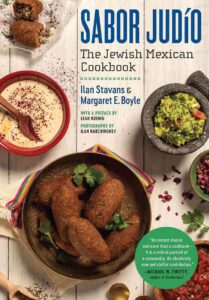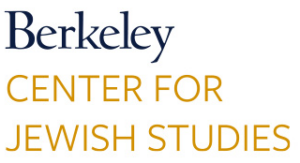
- This program has passed.
Diasporic Kitchens: Jewish-Mexican Recipes and Stories
Sep 18 @ 5:00 pm - 6:30 pm

Join Berkeley’s Center for Jewish Studies and the Magnes Collection of Jewish Art and Life for Diasporic Kitchens: Jewish-Mexican Recipes and Stories, a conversation, cooking demo, and tasting with Ilan Stavans and Margaret Boyle, authors of Sabor Judío: The Jewish-Mexican Cookbook, named a 2024 finalist in cookbooks and food writing by the Jewish Book Council. Stavans and Boyle will discuss how recipes from the collection tell stories about migration, identity, and memory, highlighting key people and places from the collection. The talk will also engage with how past and future generations use recipes as a way to sustain community and shape belonging. Following the conversation they will demonstrate one of the recipes, tastes will be available and the authors will sign books.
Thursday, September 18, 2025 | 5:00-6:30 pm
In person at the Magnes Collection of Jewish Art and Life, 2121 Allston Way, Berkeley, CA
Ticket prices:
- FULL PRICE: $25.00
- MUSEUMS FOR ALL: $5.00 (EBT/SNAP card required for entry)
- STUDENTS: $5.00 (Current student ID will be required for entry.)
Tickets at the door will be sold to capacity by cash or check only.
If you have any questions about accessibility or require accommodations to participate in this event, please contact us at magnes@berkeley.edu or call us at (510) 643-2526 with as much advance notice as possible.
About the authors
 Ilan Stavans, a leading Jewish Mexican scholar and critic, is the Lewis-Sebring Professor of Humanities and Latin American and Latino Culture at Amherst College. His books include On Borrowed Words, Spanglish, Dictionary Days, The Disappearance, and A Critic’s Journey. He has edited The Norton Anthology of Latino Literature, the three-volume set Isaac Bashevis Singer: Collected Stories, The Poetry of Pablo Neruda, among dozens of other volumes. He is the recipient of numerous awards and honors, including a Guggenheim Fellowship, Chile’s Presidential Medal, the International Latino Book Award, and the Jewish Book Award. Stavans’s work, translated into twenty languages, has been adapted to the stage and screen. A cofounder of the Great Books Summer Program at Amherst, Stanford, Chicago, Oxford, and Dublin, he is the host of the NPR podcast “In Contrast.”
Ilan Stavans, a leading Jewish Mexican scholar and critic, is the Lewis-Sebring Professor of Humanities and Latin American and Latino Culture at Amherst College. His books include On Borrowed Words, Spanglish, Dictionary Days, The Disappearance, and A Critic’s Journey. He has edited The Norton Anthology of Latino Literature, the three-volume set Isaac Bashevis Singer: Collected Stories, The Poetry of Pablo Neruda, among dozens of other volumes. He is the recipient of numerous awards and honors, including a Guggenheim Fellowship, Chile’s Presidential Medal, the International Latino Book Award, and the Jewish Book Award. Stavans’s work, translated into twenty languages, has been adapted to the stage and screen. A cofounder of the Great Books Summer Program at Amherst, Stanford, Chicago, Oxford, and Dublin, he is the host of the NPR podcast “In Contrast.”
 Margaret E. Boyle is Professor of Romance Languages and Literatures and Latin American, Caribbean and Latinx Studies at Bowdoin College. Her writing and research spans the language, literature and culture of early modern Spain and colonial Latin America Her primary interests include Hispanic women’s literary and cultural history, theater history and performance, and health humanities, including medical, spiritual and food cultures. Boyle is also the director of Multilingual Mainers, an elementary world languages and cultures program providing age-appropriate tools to combat xenophobia, racism and intolerance through engagement with languages other than English. She has been awarded a Fulbright Senior Scholar as well as grants from the National Endowment for the Humanities and the Whiting Foundation for work in cultural and international exchange.
Margaret E. Boyle is Professor of Romance Languages and Literatures and Latin American, Caribbean and Latinx Studies at Bowdoin College. Her writing and research spans the language, literature and culture of early modern Spain and colonial Latin America Her primary interests include Hispanic women’s literary and cultural history, theater history and performance, and health humanities, including medical, spiritual and food cultures. Boyle is also the director of Multilingual Mainers, an elementary world languages and cultures program providing age-appropriate tools to combat xenophobia, racism and intolerance through engagement with languages other than English. She has been awarded a Fulbright Senior Scholar as well as grants from the National Endowment for the Humanities and the Whiting Foundation for work in cultural and international exchange.
About the book
 Offering 100 delicious, accessible recipes, this is the first cookbook to tell the centuries-long story of the fusion between Jewish and Mexican cuisine.
Offering 100 delicious, accessible recipes, this is the first cookbook to tell the centuries-long story of the fusion between Jewish and Mexican cuisine.
Sabor Judío celebrates the delicious fusion of two culinary traditions, Jewish and Mexican. Written with joy and verve, Ilan Stavans and Margaret Boyle’s lavishly illustrated cookbook demonstrates how cooking and eating connect Jewish Mexicans across places and generations. Featuring 100 deeply personal recipes enjoyed by Jewish Mexicans around the world, the book is organized by meal—desayuno (breakfast), comida (lunch), and cena (dinner)—and also includes dishes made for Shabbat, Rosh Hashanah, Yom Kippur, Passover, Hanukkah, Shavuot, and other holidays.
Sabor Judío isn’t only a cookbook; it is also a vibrant history of Jewish immigration to Mexico from 1492 to the present. It explains how flavors and dishes evolved in Mexican and Jewish kitchens and how they fused into a distinct cuisine, mainly by the labor of Ashkenazi, Sephardic, Mizrahi, and converso women. This cookbook is the product of two award-winning, internationally known Jewish Mexican writers and foodies who spent a decade gathering recipes and personal narratives from Jewish Mexican households. The result is a dynamic and delicious array of recipes and experiences, infusing important cultural heritage into this essential culinary record.
PRESENTED BY
WITH PARTNERS






